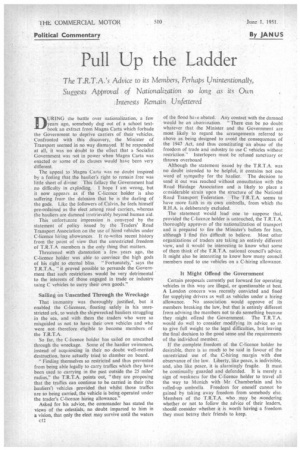Pull Up the Ladder
Page 50

If you've noticed an error in this article please click here to report it so we can fix it.
The T.R.T.A.'s. Advice to its Members, Perhaps Unintentionally, Suggests Approval of Nationalization so long as its Own ;Interests Remain Unfettered DLIRING the battle over nationalization, a few years ago, somebody dug out of a school textbook an extract from Magna Carta which forbade the Government to deprive carriers of their vehicles. Confronted with this discovery, the Minister of Transport seemed in no way dismayed. If he responded at all, it was no doubt to the effect that a Socialist Government was not in power when Magna Carta was enacted or some of its clauses would have been very
different. .
The appeal to Magna Carta was no doubt inspired by a feeling that the haulier's right to remain free was little short of divine: This fallacy the Government had no difficulty in exploding. I hope I am wrong, but it now appears as if the C-licence holder is also suffering from the delusion that he is the darling of the gods. Like the followers of Calvin, he feels himself pre-ordained as the elect among road carriers, whereas the hauliers are damned irretrievably beyond human aid.
This unfortunate impression is conveyed by the statement of policy issued by the Traders' Road Transport Association on the use of hired vehicles under C-licence hiring allowances. It re-writes recent history from the point of view that the unrestricted freedom of T.R.T.A members is the only thing that matters.
Threatened with damnation a few years ago, the C-licence holder was able to convince the high gods of his right to eternal bliss. "Fortunately," says the T.R.T.A., "it proved possible to persuade the Government that such restrictions would be very detrimental to the interests of those engaged in trade or industry using C vehicles to carry their own goods."
Sailing On Unscathed Through the Wreckage
That immunity was thoroughly justified, but it enabled the C-licensee, floating safely in his unrestricted ark, to watch the shipwrecked hauliers struggling in the sea, and with them the traders who were so misguided as not to have their own vehicles and who were not therefore eligible to become members of the T.R.T.A.
So far, the C-licence holder has sailed on unscathed through the wreckage. Some of the hardier swimmers, instead of acquiescing in their no doubt well-merited destruction, have actually tried to clamber on board.
" Finding themselves so restricted and thus prevented from being able legally to carry traffics which they have been used to carrying in the past outside the 25 miles' radius," the T.R.T.A. points out, "they are proposing that the traffics can continue to be carried in their (the hauliers') vehicles provided that whilst those traffics are so being carried, the vehicle is being operated under the trader's C-licence hiring allowance."
Asked for his advice, the commander has stated the views of the celestials, no doubt imparted to him in a vision, that only the elect may survive until the waters
c12
of the flood ha,.e abated. Any contact with the damned would be an abomination. "There can be no doubt whatever that the Minister and the Government are most likely to regard the arrangements referred to above as being designed to avoid the consequences of the 1947 Act, and thus constituting an abuse of the freedom of trade and industry to use C vehicles without restriction." Interlopers must be refused sanctuary or thrown overboard Although the statement issued by the T.R.T.A. was no doubt intended to be helpful, it contains not one word of sympathy for the haulier. The decision to send it out was reached without consultation with the Road Haulage Association and is likely to place a considerable strain upon the structure of the National Road Transport Federation. The T.R.T.A. seems to have more faith in its own umbrella, from which the RI-IA. is deliberately excluded.
The statement would lead one to suppose that, provided the C-licence holder is untouched, the T.R.T.A. thoroughly approves of the nationalization of transport and is prepared to fire the Minister's bullets for him, although I find this difficult to believe. Most other organizations of traders are taking an entirely different view, and it would be interesting to know what some of them think of the national council's advice. It might also be interesting to know how many council members need to use vehicles on a C-hiring allowance.
It might Offend the Government Certain proposals currently put forward for operating vehicles in this way are illegal, or questionable at best. A London concern was recently convicted and fined for supplying drivers as well as vehicles under a hiring allowance. No association would approve of its members breaking the law, but that is entirely different from advising the members not to do something because they might offend the Government. The T.R.T.A. would do well to consider modifying its advice so as to give full weight to the legal difficulties, but leaving the final decision to the good sense and the requirements of the individual member.
If the complete freedom of the C-licence holder be desirable, there is as much to be said in favour of the unrestricted use of the C-hiring margin with due observance of the law. Liberty, like peace, is indivisible, and, also like peace, it is alarmingly fragile. It must be continually guarded and defended. It is merely a sign of weakness for the C-licence holder to travel all the way to Munich with Mr. Chamberlain and his rolled-up umbrella Freedom for oneself cannot be gained by taking away freedom from somebody else. Members of the T.R.T.A. who may be wondering whether or not to follow the advice of their leaders, should consider whether it is worth having a freedom
they must betray their friends to keep. •




























































































